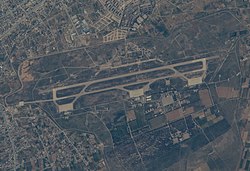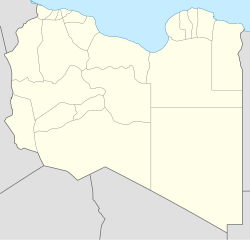Misrata International Airport مطار مصراتة الدولي | |||||||||||
|---|---|---|---|---|---|---|---|---|---|---|---|
 | |||||||||||
| Summary | |||||||||||
| Airport type | Public/Military | ||||||||||
| Operator | Libyan Airports Authority | ||||||||||
| Location | Misrata, Libya | ||||||||||
| Opened | 1998 | ||||||||||
| Elevation AMSL | 60 ft / 18 m | ||||||||||
| Coordinates | 32°19′32″N15°3′35″E / 32.32556°N 15.05972°E | ||||||||||
| Website | www.misurataairport.ly | ||||||||||
| Map | |||||||||||
 | |||||||||||
| Runways | |||||||||||
| |||||||||||
Misrata International Airport( IATA : MRA, ICAO : HLMS) is an international airport serving Misrata, a Mediterranean coastal city in the Misrata District of Libya. It also acts as an air base and training center for the Libyan Air Force. [3]
